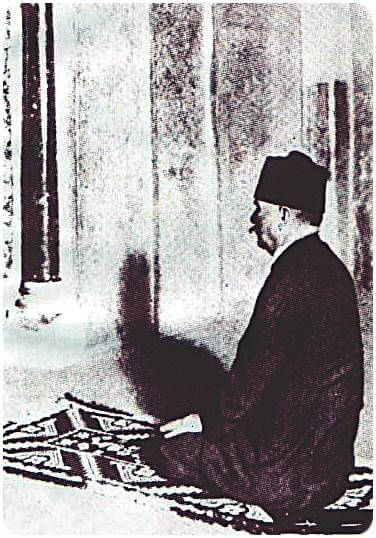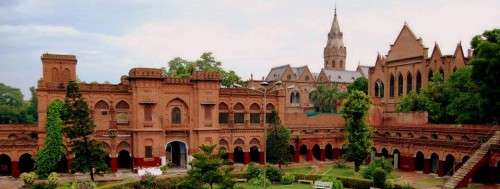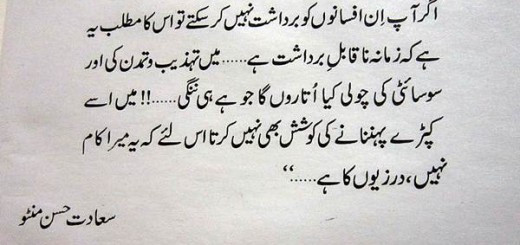Iqbal on Sufism: A Detailed Study
Iqbal was a Sufi and believed in the supremacy of Ishq over Intellect, the soul over the body. His father was a Sufi and belonged to the Qadri order. In one of his verses Iqbal said “See me, a Brahmin born versed in the mystic lore of Rumi and Tabriz.”
Most of the Sufis believed in the doctrine of Wahdatul Wujud, or pantheism. The basic concepts of this doctrine are: Huma Ust (All is He) and Huma AZ Ust (All is from Him). The doctrine implies that God alone is the Reality; everything else is an illusion. This means that life is nothing, and as such the proper course for man is to renounce the world, Which is an illusion, and seek annihilation by absorption in God. Apparently this philosophy was attractive. Under its impact many men of God took to the Khanqah, and spent their lives in the contemplation of God.
When Iqbal wrote his study “The Development of Metaphysics in Persia”, he too was attracted by the doctrine of pantheism. The earlier poems of Iqbal have a ring of pantheism about them.
In Europe, Iqbal had the occasion to see the western nations at work. He saw that in Europe the State and the Church had been separated. The Church advocated renunciation and asceticism. The state stood for action and making full use of fife. The activist state had no option but to discard the Church. As a consequence of such separation, the western civilisation fell a victim to materialism.
When Iqbal returned to India, he found that the western thought had invaded India, and that Islam would have to fight against such thought for bare survival. He found that there were forces within Islam which were corroding its strength. Sufism stood for renunciation and annihilation more or less like the Church in Christianity. Such negative concept of Islam could never sustain an activist State. Things were thus moving in the direction that in Islam too the State and the Church should be separated. But Iqbal saw the danger In such separation and that set him thinking. In Islam, the Church and the State were one organic unity. As such the State and the Church could not pull in different directions. In Islam you could not have an active State on the one hand, and an inactive Islam in the shrines on the other hand. That meant that Islam had to choose between activity and inactivity, it could not be both active and inactive at the same time. Islam had come to establish a new order in the world and as such it could not be inactive. This implied that Sufism which deified inactivity was repugnant to Islam. Iqbal, therefore, came to the conclusion that Islam should be purged of such Sufism.
In Islam there were Sufis and Sufis. While most of the Sufis took the pantheist view there were Sufis who deprecated such inactivity, Hazrat Junayd Baghdadi, Hazrat Data Ganj Baksh, Hazrat Mian Mir; Hazrat Bu Ali Qalandar, Hazrat Mujaddid Alf Sani, Hazrat Mueenuddin Chishti Ajmeri; Hazrat Nizamuddin Aulia to name a few stood for activity. When, therefore, Iqbal wanted to purge Islam of Sufism, his revolt was against that school of Sufism which stood for passivity. He vehemently supported the dynamic school, of Sufism. Iqbal remained a Sufi throughout his life, but his Sufism was dynamic and not passive.
The passivity in Sufism was due to Greek thought and unhealthy practices of the Sufis in Persia. Iqbal accordingly launched a crusade both against the Greek and Persian thought. About the impact of the Persian mysticism on Islam, Iqbal remarked as follows In a letter dated 10th July 1916 addressed to Siraj- uddin Pal (Iqbal Namah):
“The search for inner meanings or perception of hidden meanings in the code of a religion or a way of life of a nation amounts to its nullification. This Is a very subtle method of abrogation adopted by those who are sheep*like in their fundamental nature. Most of the Persian poets, by their very inherent tendency, had an inclination towards the doctrine of Wahdatul Wajud. The tendency was present in Persia before the rise of Islam. The latter was, however, able to hold it back for some time, but Persia’s dormant or natural instinct was bound to make its appearance at the first available opportunity with ever more vigour, and there started pouring into Islam a literature which was based on the doctrine of Wahdatul Wajud. The Persian poets tried to undermine the way of Islam, by a very round about, though apparently, heart alluring manner. They denounced every good thing of Islam; if Islam looked upon poverty as an evil, they admired it as excellent. Jihad is deemed necessary in Islam; the Persian poets attempted to interpret it with new meanings, and made contemplation in a monastery the highest crusade in the way of God.
The Sufis have smuggled, without any hesitation, Persian and Greek ideas into the body of Islam. The first poet of Sufism is Iraqi who has versified the teachings of Ibn al-Arabi, and the last poet is Hafiz. It is surprising that the whole poetry of Sufism in Islam was produced in the period of political decline. The nation which exhausts its fund of energy and power, as was the case with the Muslims after the Tartarian invasions, undergoes a change of outlook. The weakness becomes for it an object of beauty and appreciation; and resignation from the world a source of satisfaction.”
In the journal “New Era” of July 1917, Iqbal contributed an article on “Islam and Mysticism”. Iqbal said:
“The present day Muslim prefers to roam about aimlessly in the dusky valleys of Hellenic-Persian mysticism which teaches us to shut our eyes to the hard Reality around, and to fix our gaze on what is describel as ‘illuminations’, blue, red and yellow, reality springing up from the cells of an overworked brain. To me this self-mystification, this Nihilism, i.e. seeking Reality in quarters where it does not exist is a physiological symptom which gives us a clue to the decadence of the Muslim world. The intellectual history of the ancient world will reveal to you this most significant fact that the decadent in all ages have tried to seek shelter behind self mystification and Nihilism. Having lost the vitality to grapple with the temporal, these prophets of decay apply themselves to the quest of a supposed eternal; and gradually complete the spiritual impoverishment and physical degeneration of their society by evolving a seemingly charming ideal of life which seduces even the healthy and powerful to death.”
Iqbal observed that to such a peculiarly constructed spciety as Islam the work of these sentimental obscurantists had done immense harm. The birth of the Muslims as a society repudiating the ideas of race and language as principles of social reconstruction was due only to the Muslims subjecting themselves to a system of Law believed to be Divine in origin; yet the old Mystic frankly held and secretly preached it to be merely phenomenal; nothing more than an outer husk of the Real which was to be attained by means other than the Law of God. jn.most cases the observance of the Law, even though held to be phenomenal was retained to avoid social odium; but no student of Muslim thought and literature could deny that the tendency to ignore the Law-the only force holding together Muslim society was the direct consequence of a false mysticism born of the heart and brain .of Persia. Thus Muslim’ Democracy was gradually displaced and enslaved by a sort of spiritual aristocracy pretending to claim knowledge and power not open to the average Muslim. The danger of such Pertlanisation of Islam was seen by saints like Sheikh Ahmad Rifai.
Iqbal said that the conquest of Persia meant not conversion of Persia to Islam, but the conversion of Islam to Persianism. He observed:
“Read the intellectual history of the Muslims of Western and Central Asia from the tenth century downwards, and you will find therein verified every word that I have said. Such are the charms of decadence. We drink the poison and kiss the hands of those who administer it.*’
Iqbal wanted the Muslims to remember that Islam was born in the broad day light of history. The great democratic Prophet lived and worked among intelligent men who had transmitted to posterity every word that dropped from his sacred lips. There was absolutely nothing esoteric in his teachings! Iqbal observed that every word of the Quran is brimful of light and joy of existence. Far from justifying any gloomy, pessimistic mysticism, it is an open assault on those religious teachings which had for centuries mystified mankind.
Iqbal gave the call:
“Accept, then, the reality of the world cheerfully and grapple with it for the glorification of God and His prophet. Do not listen to him who says there is a secret doctrine in Islam which cannot be revealed to the uninitiated. Herein lies the power of this pretender and your thraldom. See how in the spirit of Roman Christianity he builds fortification round himself with a view to save fiis realms of darkness against the possible invasions of the historian. He enslaves you by exploiting your ignorance of the history of Islam; but seeing clearly that the light of history may sometime dispel the mist of his teaching from your intellectual atmosphere, he teaches you to regard sense perception as the greatest veil. Thus this enemy of sense-reality blunts your sense for fact and undermines the very foundations of the science of history.”
Addressing the Muslim young men Iqbal said:
“Muslim youngmen! Beware of the mystifier! His noose has now been too fong round your neck. The regeneration of the Muslim worldies in the strong uncompromising, ethical Monotheism which was preached to the Arabs thirteen hundred years ago. Come, then, out of the fogs of Persianism and walk into the brilliant desert-sunshine of Arabia.”
Download some great Poems of Allama Iqbal sung by renwned artists in MP3 [couresty of www.thesufi.com].
- Sitaron Se Aage Jahan Aur Bhi – Rahat Fateh Ali Khan [Kalam-e-Iqbal]
- Silsila-e-Roz o Shub-Kalaam Allama Iqbal
- Saqi Nama [Zamane Ke Andaz Badle Gaye] (Kalam Allama Iqbal) – Junoon
- Sitaron Se Aage Jahan Aur Bhi – Rahat Fateh Ali Khan [Kalam-e-Iqbal] – Abridged Version
- Ya Rab Dil-e-Muslim Ko Woh Zinda Tamanna de – By Shehzad Roy
- Apna Maqam Paida Kar by Rahat Fateh Ali Khan
- Kalam e Iqbal Khudi ka Sarre Nihan La Ilaha Ilallah – Sanam Marvi














